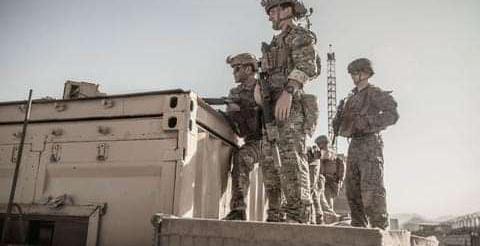By Rose Onda
U.S. anti-missile defences intercepted as many as five rockets fired at Kabul’s airport early on Monday, a U.S. official said, as the United States rushed to complete its withdrawal from Afghanistan to end its longest war.
Afghan media said the attack was launched from the back of a vehicle.
The Pajhwok news agency said several rockets struck different parts of the Afghan capital.
Initial reports did not indicate any U.S. casualties, the U.S. official, speaking on condition of anonymity, told Reuters.
The attack followed a huge Islamic State suicide bombing outside the airport gates on Thursday that killed scores of Afghans and 13 U.S. troops and another reported attempted bombing on Sunday.
The U.S. and allied forces have evacuated about 114,400 people, including foreign nationals and Afghans deemed “at-risk”, in an effort that began a day before Kabul fell to the Taliban on Aug. 15. The forces themselves are due to pull out by a Tuesday deadline agreed with the Islamist militants.
President Joe Biden reconfirmed his order for commanders to do “whatever is necessary to protect our forces on the ground” after he was briefed on Monday’s rocket fire, the White House said. He was told airport operations continued uninterrupted, it added.
On Sunday, Pentagon officials said a U.S. drone strike killed a suicide car bomber who had been preparing to attack the airport on behalf of ISIS-K, a local affiliate of Islamic State that is an enemy of both the West and the Taliban.
U.S. Central Command said it was investigating reports of civilian casualties.
“We know there were substantial and powerful subsequent explosions resulting from the destruction of the vehicle, indicating a large amount of explosive material inside that may have caused additional casualties,” it said.
The drone attack killed seven people, Taliban spokesman Zabihullah Mujahid told China’s state television CGTN on Monday, criticising the U.S. action on foreign soil as unlawful.
It was the second such condemnation after a U.S. drone strike on Saturday killed two Islamic State militants in the eastern province of Nangarhar, in an attack the spokesman said had wounded two women and a child.
Afghans fearful of reprisals under Taliban rule continued to crowd the airport, appealing to foreign powers for a way out.
“We are in danger,” said one woman outside the airport. “They must show us a way to be saved. We must leave Afghanistan or they must provide a safe place for us.”
Two U.S. officials told Reuters evacuations would continue on Monday, prioritising people deemed at extreme risk. Other countries have also put in last-minute requests to bring out people in that category, the officials said.
The Taliban will take full control of Kabul airport after the American withdrawal on Tuesday, Qatar’s Al Jazeera television network cited an unidentified Taliban source as saying.
As the evacuations wind down, a “far greater humanitarian crisis” looms ahead for the nation of 39 million people, the U.N. refugee agency warned.
Agency chief Filippo Grandi reiterated a call for borders to remain open and for more countries to share the “humanitarian responsibility” of accepting refugees with Iran and Pakistan, which already host 2.2 million Afghans.
“More resettlement options are sorely needed.
“They are critically important, not only to save lives but also as a demonstration of goodwill,” added Grandi, whose agency said last week that up to 500,000 Afghans could flee by year-end.
Biden attended a ceremony on Sunday at Dover Air Forces Base in Delaware to honour members of the U.S. military killed in Thursday’s suicide bombing.
As the flag-draped transfer caskets carrying the remains emerged from a military plane, the president, who has vowed to avenge the Islamic State attack, shut his eyes and tilted his head back.
None of the fallen service members was older than 31, and five were just 20, as old as the war in Afghanistan itself.
The departure of the last troops will end the U.S.-led military intervention in Afghanistan that began in late 2001, after the al Qaeda Sept. 11 attacks on the United States.
U.S.-backed forces ousted a Taliban government that had provided safe haven for al Qaeda leader Osama bin Laden, who was finally killed by U.S. forces in Pakistan in 2011 and have engaged in a counter-insurgency war against the Islamist militants for the past two decades.
The Taliban’s rule from 1996 to 2001 was marked by a harsh version of sharia Islamic law, with many political rights and basic freedoms curtailed and women severely oppressed.
Spokesman Zabihullah Mujahid has said the Taliban will announce a full cabinet in the coming days, and that difficulties will subside quickly once the new administration is in place.
But the economy has been shattered by decades of war, with the added burden of a drought and the coronavirus pandemic, and now faces a sudden halt in inflows of billions of dollars in foreign aid.




